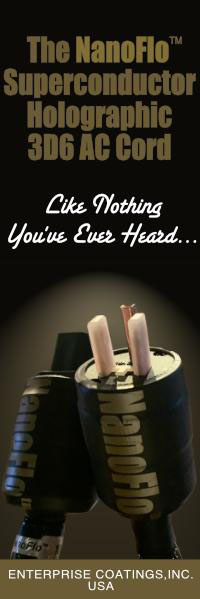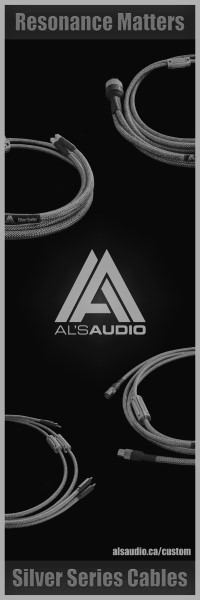Vitus SM-101 Monoblock amplifier
| Vitus SM-101 Monoblock amplifier |
| The Thunder and the Silence |
|
Part One |
|
January 2007 |

I promised myself some 10 years ago that once this endeavor of writing about audio stopped being fun, I would recede quietly into the inky, black night. After all, my enjoyment of music was far too important, too vital to my being to contaminate it with frustration, or even worse, malevolence. Luckily, my inability to keep to such virtuous proclamations has kept me in the game, and what a game it has been. This year has proven to be bottom of the ninth, basses loaded and a full count for all the components that have come to bat. Like some dream team line up, there has been one clutch hit after another. From the Focus Audio Master II loudspeakers to the Von Schweikert VR7 loudspeakers to the Nova Acoustics Memory Player, I have been introduced to a whole new level, a flier into what is possible in high-end audio.
Coming off my review of another heavy hitter, the Karan Acoustics KA S450, which raised the bar for both price and performance, I was presented with the opportunity to review the new $50,000 100 watt-per-channel, user switchable Class A/AB mono-block amplifiers from relative newcomer Vitus Audio from Denmark. I had heard some pretty positive things about them from fellow ST Editor Dave Thomas who heard them at last years CES. Being that the North American importer is Focus Audio, it seemed a good fit, as I still had possession of the venerable Focus Master II loudspeakers. After a protracted wait due to production schedules and overzealous customs agents, the SM-101 amps arrived. Uncrating these beasts really should be a two-man job, but for what I have lost in the last ten years in brute strength, I have gained in the understanding of physics and leverage, enabling me to extract the SM-101s from their boxes and wrestle them into position. Lined up alongside of the Karans, they made those otherwise brawny amps look down right diminutive. They are taller than the typical amp and the extra height goes a long way in setting the Vitus amplifiers apart, lending stature to the strength of their wonderfully austere design. My amps came in black, though they are available in Silver as well. The front panel has three buttons on the left side of the recessed acrylic center strip which embodies the razor sharp back lit Vitus “V” and the display for the amplifiers’ “Standby” and “Class A/AB” output status. You can also adjust the brightness of the display from the front buttons as well. The rear panel sports some great hand- tightenable binding posts. It’s a mystery to me why more manufacturers don’t use these. If it adds $100 to the cost of a high-end amp, it would be well worth it. I can’t imagine any audiophile not being willing to pay for such a well-engineered feature.
And if there was any question about the “I take myself way too seriously” attitude embodied by many high-end designers, look no further than the description of themselves on their website (here) as the “weird and highly skilled minds behind Vitus Audio”, and how they claim the SM-101’s power output spec as “More than enough!” How refreshing.
Yes, the build quality is exemplary. The casework is freaking lust-inducing gorgeous. But by my math, the $50K asking price breaks down to $500 a watt, by far and away the highest price-to-watt ratio I have ever listened to in (or out) of my home. Quite frankly, I had no idea the amps were rated only 100 watts-per-channel when I received them. I probably would never have agreed to review them, as I know for a fact that 100 watts could never, ever even on a good day drive the VR7s in my huge room. Perhaps the Focus Master II, but they were waiting to be upgraded so my first impressions came through the VR7.
Right out of the box, I knew something special, very special was happening. While perhaps a tad cool and a bit on the lean side, the sound was so clean, so clear and focused, my system no longer sounded familiar. I simply was not prepared for the dramatic change. After all, while amps are important, their differences are usually pretty subtle, more often differentiated by shifts in tonal balance and the varying characteristics related to power/damping factor ratings. This is a simplification of my experience, for sure. However, I have listened to probably fifteen amps in the last few years. Some of them were very good, a couple great, and in the case of the last amp I reviewed, the Karan Acoustics KA S450, a phenomenal piece of gear. And then came the Vitus SM-101.
What sets the Vitus apart? First off, within it’s limits, and every component has them, the bass control/transient speed and dynamic impact is the best I have ever heard from a solid-state amplifier. It is truly astounding, astonishing, or just go ahead and make up a word that goes beyond these adjectives to describe the performance those 100 class-A watts provide. Every disc I played to evaluate the bass of these amps was transformed. The absence of any coloration, darkening, bloating, spreading of warmth into the mid-bass or lower midrange allowed for intense rhythmic pace and swing. Track one, “War Heads”, from Extreme’s Three Side To Every Story [A&M31454] explodes after the intro with a kick drum dominated back beat. I have listened to this track at least a thousand times, and I am here to tell you, it has never sounded anything like this. Some amps make it sound big and bold, some make it sound a bit leaner but tighter and drier. The Vitus gets it perfectly balanced. The lower registers are fast with chest thumping power yet perfectly defined and resonant without the drying out of the drums natural bloom. The interplay with the Bass guitar is perfectly integrated and clear. This is no small task as the recording of the bass line is extremely tight, not to mention the precision and speed with which the bass is played.
With the foundation established all types of music benefits from this transparency and lack of noise. And It all comes back to down to the noise floor folks. The best component designs have dealt thoroughly with this issue, as have all great audio systems. I have recently included the PS Audio Harvesters in concert with the Shakti Audio Stones. Each addresses noise from different angles. The Harvesters are on-line devices the remove noise from the flow of electricity. The Stones are passive objects placed on or under components removing RFI. Run, do not walk and get these in your rig, you need them. With them, the majesty of the amp’s vast silence reveals a level of texture, detail and space that has left me using such glowing terms over and over to describe these amps.
My man CP (Clement Perry) and I often talk about how a great system can never be geared towards or play one type of music over another. Sound is sound, whether being created by an oboe or a Stratocaster. It is understandable if the listener listens only to classical or jazz for instance, to settle on components that may mimic one characteristic or another, but at this level, the component in question should be the servant, never the master when answering the music’s demands. In this vein, the Vitus utterly succeeds. From the very depths of the bass, through the ultrasonic high frequencies, the lack of distortion allows the Vitus to personify what neutral could and should be in the best sense of the word. It is truly uncanny and once experienced, there is no going back.
Within the context of these great results, the system really comes together with the inclusion of the Vitus Andromeda interconnects, speaker wire and power chords. These cables are designed by Vitus’ partner Anders Grove, the former founder and designer of the highly regarded Argento Audio cables, and a gentleman who knows his way around a wire. Here, he has come through with some seriously potent designs. As with the amplifiers, the effect is immediate and unmistakable. Naturally warm, open, exquisitely detailed and unrestricted dynamics come together in equal measure. There is a lack of any grain or tonal unevenness to get in the way. An entire review could be dedicated to the Vitus wire and when time permits, I will elaborate further, perhaps when I review the Vitus preamp and the soon to be released Vitus CD player.
I have yet to hear an analog/solid-state amp that is able to unravel complex passages and so tightly focus individual sounds and images within the mix, while at once sounding of one piece and coherent. The Freedom from the overlap of noise gives each and every corner of the soundstage space to breathe and “light up” as the music demands. The Grieg Piano concerto from Chesky Records [CD050] demonstrates this well. While not the finest classical recording, the performance is passionate and the stage is wide and deep, if a bit recessed. The SM-101s delineate the piano and anchor it to the stage with surprising clarity. The horns, which seem to appear out of nowhere, light up the rear of hall, again, with great precision and focus. This is an amp that banishes ambiguity into a distant memory.
If there is a rub (when a component is manmade there’s always one), it’s the absence of distortion and coloration may make it difficult to keep the SM-101s from straying into the lean or cool side of the spectrum. The Vitus wire’s natural, evenhanded balance helps a great deal in this regard, as would a speaker with an open, fleshed-out, midband. The Focus Master II, with its upgraded crossover coil in place, really fit the bill. The Von Schweikert VR7, while no slouch, sounded a bit pinched and edgy when partnered with the SM-101s. With the Master II comes a synergy that leaves little doubt as to either component’s proficiency. The Master II poses a midband and treble that is as smooth as can be, allowing voices to soar through the frequency range without any ringing or “shouting.” With the help of the Tact Audio 2.2x room correction preamp, I can further correct for spectral imbalances and contour the sound with little penalty. A terrific example of the Vitus/Focus midband strength came from the Willie Nelson disc, Healing Hands of Time. The moment the song moves beyond the opening and the performance opens up with the full orchestra supported by a wonderfully potent and extended bass, the sound through the Vitus amps can only be described as majestic. This is a disc that is really easy to get wrong. Willie’s voice is very closely miked and carries an edge that can be very grating if the component embellishes in that direction. While the Vitus amps clearly reveal this in the recording, it tracks the intensity of the midband forwardness with a very precise touch, while getting every thing around this narrow band of trouble just right.
Conclusion
This first look at the Vitus SM-101 monoblock amplifiers has been a real eye and ear opener. 100 watts of class-A amplification that behaves like 300 or more. A noise floor reduced by a magnitude, creating an unmistakable sense of precision, speed, neutrality and control, all add up to a compelling musical presentation unmatched in these areas by any analog solid-state amplifier I have yet to hear. Partner this amp with suitable components and a uniquely high-end musical experience is forever on tap.
In part two, I will look into the unique technology employed in the SM-101, as well as a report on the inclusion of the Vitus SL-101 preamp and hopefully, the new Vitus SCD-010 CD player. We will also get to know the man behind the designs, Han Ole Vitus.
Greg Petan
__________________
Technical Specifications :
Vitus Audio Power amplifier SM-101
• Inputs:
1 x unbalanced (RCA) – 1 x balanced (XLR)
• Input resistance:
10Kohm RCA – 600ohm XLR.
• Outputs:
2 Pair pure copper bindingposts pr. ch.
• Output power:
More than enough!
• Sensitivity:
1.3Volt RMS
• S/N Ratio:
> 110dB
• Openloop bandwith:
~DC-800Khz
• Slew Rate:
> 35V/us
• Distortion (THD+N):
Better than 0.01%
• Power Consumption:
Standby ~ 3W
Class AB ~ 100W
Class A ~ 400W
• Dimensions:
310 x 435 x 610 mm (H x W x D) (Each)
• Total weight:
~74 Kg. (Each)
Price: 50,000 US
Website: www.vitusaudio.com
E-mail: info@vitusaudio.com
Phone. +45 9626 8046
Fax. +45 9626 8045
![]()
Don’t forget to bookmark us! (CTRL-SHFT-D)
Stereo Times Masthead
Publisher/Founder
Clement Perry
Editor
Dave Thomas
Senior Editors
Frank Alles, Mike Girardi, John Hoffman, Russell Lichter, Terry London, Moreno Mitchell, Paul Szabady, Bill Wells, Mike Wright, Stephen Yan, and Rob Dockery
Current Contributors
David Abramson, Tim Barrall, Dave Allison, Ron Cook, Lewis Dardick, Dan Secula, Don Shaulis, Greg Simmons, Eric Teh, Greg Voth, Richard Willie, Ed Van Winkle, and Rob Dockery
Music Reviewers:
Carlos Sanchez, John Jonczyk, John Sprung and Russell Lichter
Site Management Clement Perry
Ad Designer: Martin Perry





Be the first to comment on: Vitus SM-101 Monoblock amplifier